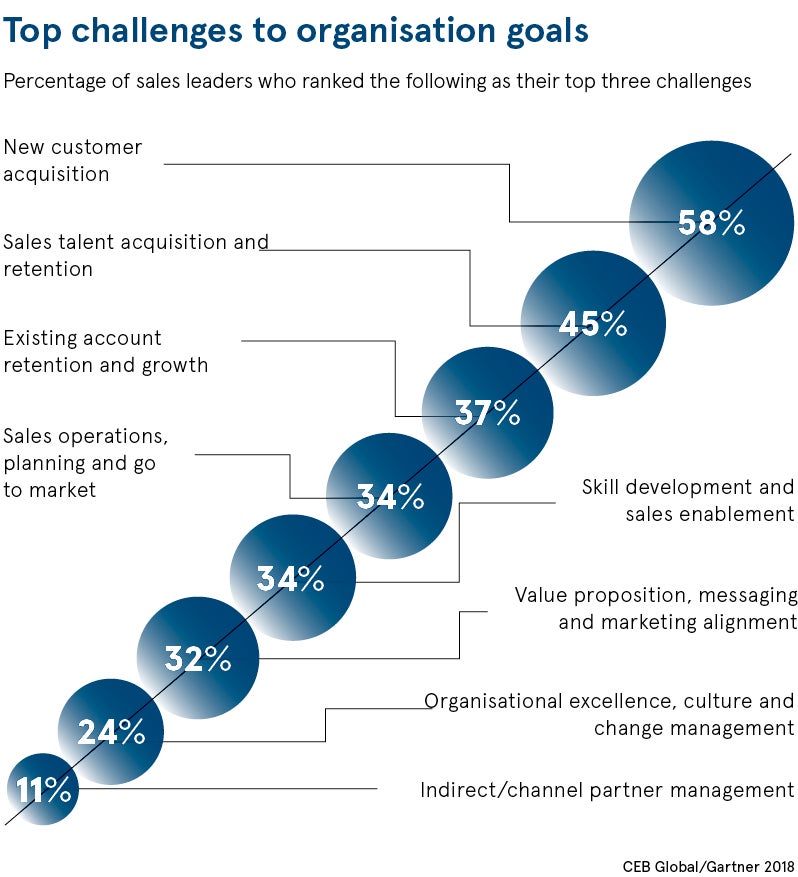Successful digital-age organisations and business leaders adroitly hit a strategic sweet spot: they sustain a strong company performance in the present while having the agility to focus on long-term development and sales goals.
Sales are integral to sustainable growth strategies, but it is hard to keep one eye on the present with the other on the future, especially these days, with market disruption always looming. There is no guarantee that just because the organisation is relevant today it will be tomorrow.
How then can business leaders adapt the way they sell to help grow, maintain or improve their position in the market?
How business leaders can future-proof sales
“This is a crucial challenge,” says Loizos Heracleous, professor of strategy at Warwick Business School. “It has been studied under different labels, such as ‘ambidexterity’ or ‘dual strategy’, but it is so important now and the answer is multi-dimensional.”
Professor Heracleous proffers practical steps for business leaders seeking to spin both plates. First, ensure the organisation “continuously undertakes experimentation, innovation and exploration of new avenues”. He continues: “Separate new initiatives in a different division so as to shield them from the dominant culture and bureaucracy.”
Next, develop employees to “better deal with competing objectives in their daily work, such as keeping up efficiency and productivity, while also caring about quality and customer service”. These two points will help cultivate a workplace culture that “encompasses an externally facing outlook and a future, developmental orientation”.
Central to this strategy, though, is a leader who has the mental nimbleness and outlook to identify “integrative, creative solutions that can satisfy objectives which are normally seen as contradictory, such as high quality and low cost, or standardisation and customisation”.
Establishing a “business as unusual” mindset
Gerd Leonhard, founder and chief executive of The Futures Agency, goes further. “The future is a mindset, not a timeframe,” says the leading Zurich-based futurist. “The common assumption that what works well today will work again tomorrow is hardened by centuries of conditioning, experience and success. This is now an extremely dangerous attitude to have.
“‘Business as usual’ has been good enough to achieve growth and financial success since the Second World War. However, in a world where exponential technological disruption is the new normal, that is no longer true. Where humanity is heading, ‘good enough’ will fall pitifully short of the level required for even survival.
“We are standing at the dawn of a world where everything is connected, where everything is becoming intelligent and where increased efficiency will enable perfection. Therefore, ‘business as usual’ is dead. Business as unusual requires a completely different mindset.”
Learning the language of data
Technological advances are spawning new business models at an exponential rate, so it is critical for leaders to keep pace. Data must be added to the traditional triple pillars of business transformation of people, process and technology.
To take advantage of the advent of data and analytics capabilities, including artificial intelligence (AI), it requires data literacy, which is currently at a pitifully low level across the business world. Data literacy is a great enabler of digital business and its mastery will enable people to “treat information as a second language”, according to global advisory giant Gartner, describing it as the must-have skill in the workplace.
Jordan Morrow, global head of Pennsylvania-based software company Qlik’s data literacy department, urges business leaders to learn how to “speak data”. Not only will this show they are progressive and wish to lead by example, thus inspiring and motivating employees, it will arm them with game-changing tech tools to supercharge sales strategies.
“Data is the new basis for business growth, relied upon by global enterprises to derive insights, increase sales and win the marketplace,” says Mr Morrow. “An organisation’s ability to achieve sustainable growth and maintain their market position is heavily dependent on its employees’ abilities to learn the language of data.”
Poor data skills are stunting sales potential
Qlik’s global study, How to Drive Data Literacy Within the Enterprise, highlighted that poor uptake is stunting sales potential. The research suggests that 76 per cent of C-suiters “lack confidence in their ability to read, work, analyse and argue with data”. Further, 85 per cent of data-literate business decision-makers say they are performing “very well” at work, compared with 54 per cent of their peers.
“This is not just preventing them from thriving in their own leadership position, but hampering their ability to drive a data cultural change across the organisation,” says Mr Morrow. “Organisations need to upskill employees fast to achieve a sustainable level of growth in the next five to ten years. Companies can still win big with a powerful collective of robotics, automation and data-literate workers, but urgent action is required.”
Truly human skills still essential for the future of sales
Conversely, while AI and automation will become more prevalent, powering sales strategies, a greater value will be placed on truly human skills, namely empathy, emotion, nuance, negotiation and networking. The personalised consumer experience is now expected and, although data may inform sales approaches and habits, humans are central to its success. Done well, it’s a win-win scenario.
Companies can still win big with a powerful collective of robotics, automation and data-literate workers, but urgent action is required
“Good salespeople build relationships with customers,” says Mike Southon, author of The Beermat Entrepreneur. “The customer becomes a mentor to the salesperson and the company. They also provide endorsements and introductions – the best form of business development.”
Mr Southon, who also warns against the pitfalls of rushing growth, adds: “Your ‘customer mentor’ shows you how to sell to your company and, this is where the strategy comes in, tells you what your company’s deepest needs are, how these are changing and what they want from you. Strategy work is only useful when based on outstanding market information and your customer mentor will provide this.”






